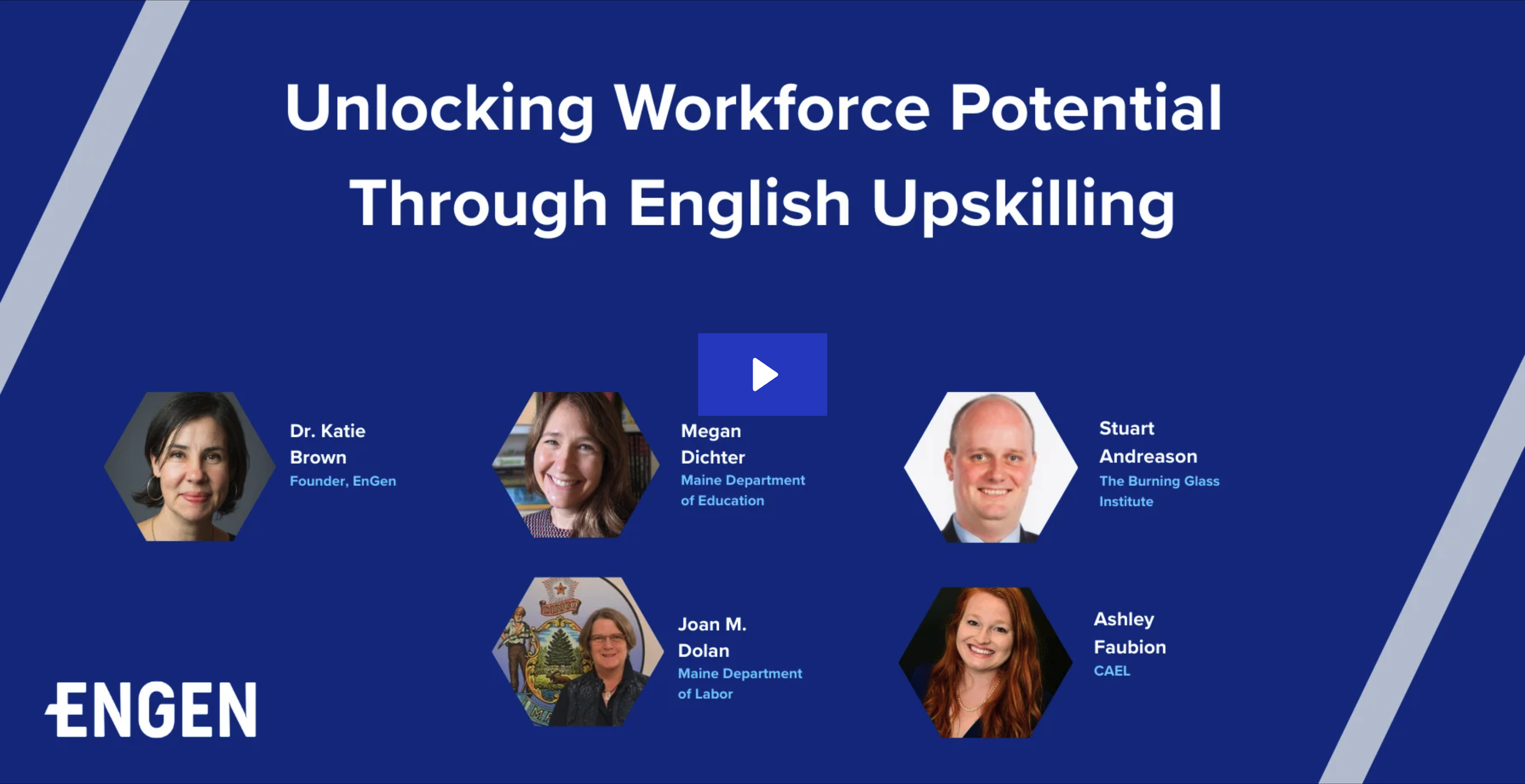Unlock Potential Through English Upskilling: Five Insights for Workforce Leaders
In today’s fast-changing labor market, one key to building future-ready workplaces is hiding in plain sight: the untapped potential of the 1 in 10 working-age adults in the U.S. with emerging English skills. English upskilling is quickly gaining ground as a transformative talent development strategy—not just for individual workers, but for employers and local governments as well.
“Communication matters. It's one of the most durable skills. Imagine if all you do is teach someone English, and suddenly they’re unlocking career pathways. If we don’t do that, we’re leaving a lot of talent on the bench.”
- Stuart Andreason, Executive Director of Programs at the Burning Glass Institute
To explore the powerful ripple effects of English upskilling, EnGen brought together leaders from the Burning Glass Institute, CAEL, the Maine Department of Labor, and the Maine Department of Education. Their conversation highlighted how investing in language skills creates more resilient talent pipelines, boosts retention, and fuels economic mobility—for everyone.
Watch the full webinar here:
Check out key insights from the conversation:
1. Investing in Workers Drives Loyalty and Retention.
When employers show they’re invested in their workers’ growth, employees stick around—and thrive. According to a recent survey of EnGen learners, 84% said they’ll likely stay with their company because English upskilling is an employee benefit; 86% said they’d refer a friend for the same reason. Upskilling isn’t a perk—it’s a retention strategy.
“I work with a top 5 Fortune 100 company and their supply chain, helping them upskill. We found English was essential—mainly for safety, promotions, and filling jobs that otherwise went unfilled.”
- Ashley Faubion, Director of Initiatives, CAEL
2. Integrate English Skills with Job Skills.
The most effective programs teach English in context—with workplace tools, tasks, and terminology built in. Take Maine’s trailblazing CNA apprenticeship pathway: Learners gain both English skills and job skills in a real-world setting, so they’re ready to step into high-demand roles. This is language learning that leads directly to employment—and opportunity.
“I've been to several CNA graduations, and the room is packed with employers who are waiting for those [multilingual] graduates, to approach them and start to set up interviews for employment. “
- Megan Dichter, State Adult Education Director, Maine Department of Education
3. Support Learners with Coaching and Local Access.
Just 4% of adult English learners currently have access to instruction. We can—and must—do better. And we know what works: Coaching to help learners set goals and stay motivated; regional and virtual education hubs to expand reach; and flexible, mobile-friendly programs to meet workers where they are. These supports remove barriers and create real access for busy working adults.
4. Scale Through Strategic Collaboration.
Small businesses often can’t build English upskilling programs alone—but they can benefit from them. That’s where public-private partnerships, state agencies, and workforce boards come in. With the right investment, the payoff is big: For every $1 invested in English upskilling, there’s a $6 economic return for local economies. That’s a powerful case for funding and policy support—and a clear incentive for cross-sector stakeholders to get involved.
5. Recognize multilingualism as a superpower.
For too long, English proficiency has been seen as a barrier instead of a workforce opportunity. Supporting multilingual speakers to build English skills creates a multilingual workforce—a powerful asset for employers.
“I met with seven fire chiefs recently. They want a firefighter apprenticeship program and absolutely want multilingual staff because when responding to calls, being able to communicate with non-English speakers is critical.”
- Joan Dolan, Director of Apprenticeships & Strategic Partnerships, Maine Department of Labor
Join the Movement
Interested in launching an English upskilling program? You don’t have to do it alone. EnGen partners with employers, state agencies, workforce boards, and educators to build programs that work—for learners, for teams, and for entire communities. We provide evidence-based best practices, multilingual coaching and enrollment support, personalized instruction, and proven ROI. Connect with us to learn we can help your workforce development goals.

